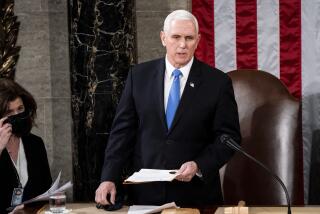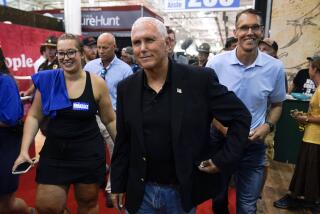Cheney Still in Background, but Not Unscathed
- Share via
WASHINGTON — Vice President Dick Cheney appears as no more than a background character in the indictment of his chief of staff, I. Lewis “Scooter” Libby. Yet even that secondary role raises questions about whether Cheney played any part in the alleged effort to discredit an administration critic.
As the Libby case moves forward, it is likely to focus more attention on the vice president’s position as one of the most powerful behind-the-scenes figures in government.
The five-count federal indictment says Cheney and Libby discussed that Valerie Plame -- the wife of Joseph C. Wilson IV, a former U.S. ambassador and an administration critic -- was a CIA operative. The conversation raises a question about what Cheney’s role may have been in any effort to discredit Wilson.
If the case goes to trial, testimony could show whether Cheney had a role in inspiring Libby’s alleged decision to unmask Plame. Even if Cheney emerges blameless, the indictment deprives him of a capable and like-minded assistant who helped him carry out his foreign policy agenda, beginning with the Iraq war.
Cheney has been “splashed by this, though not soaked,” said Ross K. Baker, a political scientist at Rutgers University.
Cheney and Libby reportedly had an unusually close working relationship, based on a strong mutual admiration. The two share hawkish foreign policy views, a wry sense of humor and a hard-charging style.
On Friday, Cheney said he accepted the resignation with “deep regret.” He called Libby “one of the most capable and talented individuals” he had ever known.
The indictment says that Cheney was the third person, after an unidentified undersecretary of State and a CIA officer, to discuss with Libby the fact that Plame was a CIA officer. It is not illegal for senior officials with security clearances to talk about classified matters. But Friday’s indictment charged that Libby subsequently made false, and thus illegal, statements about the Wilson affair in interviews with the FBI and testimony before the grand jury investigating the leak.
Libby’s conversation with Cheney took place around June 12, 2003 -- about the time Libby and unidentified other “officials in the office of the vice president” discussed how to respond to Wilson’s allegations that the administration was lying about Iraq’s alleged purchase of uranium ore from Niger, a claim that formed part of President Bush’s rationale for invading Iraq.
The indictment hints that Cheney and Libby may have discussed how to handle the Wilson problem and the media coverage of Wilson’s charges. It says that on or about July 12, returning from a trip to Norfolk, Va., with Cheney, Libby talked over “with other officials aboard the plane” what Libby should say about media inquiries, including some from Time magazine reporter Matthew Cooper.
The indictment did not indicate whether Cheney may have participated in that discussion.
Robert Boorstin, a former Clinton administration aide now at the Center for American Progress, said there was little chance that the charges would hurt Cheney in his relationship with Bush: Cheney is “still the 800-pound gorilla ... he’s still going to be the last person who whispers into the president’s ear.”
Still, Boorstin said, it will be hard for Cheney to find a replacement as effective as Libby, and that loss will probably be a blow to morale in the office of the vice president.
The indictment comes at a difficult time for Cheney, analysts said.
The vice president was one of the earliest and most influential advocates of the Iraq war, which continues to lose public support.
He has come under personal criticism recently as opponents of the war have been emboldened. Last week, in an article in the New Yorker magazine, Brent Scowcroft, who was national security advisor to President George H.W. Bush, suggested that Cheney had changed greatly since he oversaw the first Persian Gulf War as secretary of Defense. “I don’t know him anymore,” Scowcroft said.
Meanwhile, there are some suggestions that in his second term, the current president has been more inclined to follow the advice of his secretary of State, Condoleezza Rice, and to take a less hawkish line on issues such as the alleged North Korean and Iranian nuclear weapons programs.
More to Read
Get the L.A. Times Politics newsletter
Deeply reported insights into legislation, politics and policy from Sacramento, Washington and beyond. In your inbox twice per week.
You may occasionally receive promotional content from the Los Angeles Times.











